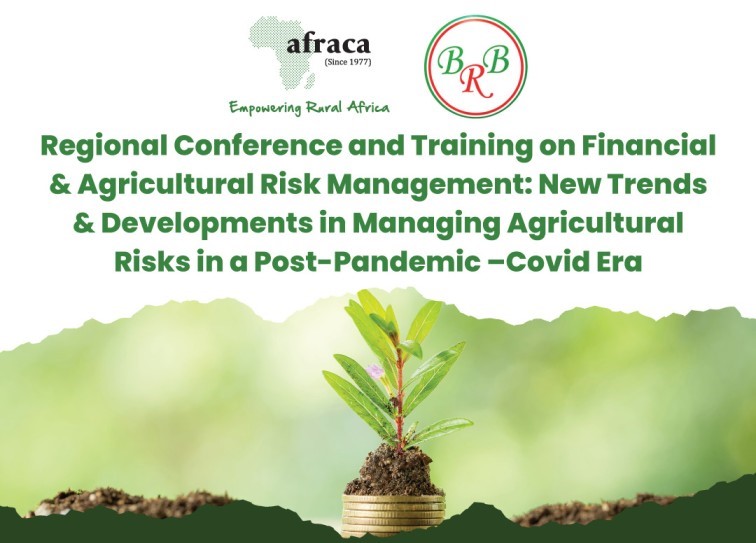

- Cet évènement est passé
Regional Conference on Financial & Agricultural Risk Management
mars 27, 2023 @ 8:00 am - mars 31, 2023 @ 5:00 pm UTC+0 at Bujumbura, Burundi
Theme: New trends and Developments in Managing Agricultural Risks in a post-pandemic -COVID era.
Introduction
Agricultural Risk Management (ARM) and the role of financial institutions
Smallholder farmers in Africa are often highly vulnerable to farm risks and uncertainties. The range of risks affecting farming households are wide- ranging from difficulties in acquiring farm inputs to major weather-related risks such as drought, floods, windstorms and hail. Inherent risks such as production risks, price and market-related risks just to name a few, remain dominant. The impact of poor management of these risks often exposes farmers to low yields and poor returns. In coping with production-related risks, for example, lack or absence of appropriate instruments means farmers will base their production decisions on minimizing exposure to risk, rather than maximizing production or profit. With no insurance to cope with shocks, farmers understandably tend to be risk averse, especially the smallholders, and prefer ‘low risk and low return’ practices such as side-selling or selling at farmgate. Other survival techniques involve choosing low-risk production technologies and low risk crops. Generally, limited access to risk management tools especially finance tools has contributed to inadequate technology adoption and slow growth of food and agricultural production in Africa. Statistics show that, Africa has lagged Asia and Latin America in terms of agricultural technology adoption.
Investing on ARM at farm-level is now viewed as a much better cost-effective option than traditional large scale humanitarian aid which usually require mobilization of large amounts of resources from the international community. Various initiatives and interventions have been designed to promote risk management strategies among smallholder farmers in Africa. Additionally, many financial institutions have come up with their own risk management tools while potential developers or collaborators of risk management are now targeting Financiers. In Warehouse Receipt Systems (WRS) for instance, inventory credit provided by financial institutions can enhance efficiency of a WRS and help farmers overcome the risk of low prices. Micro-insurance products when bundled with credit can prove useful tools for managing climatic risks. Furthermore, Insurance coverage also tends to improve the credit worthiness of participating farmers thus lowering their risk profiles, thereby making them attractive to financial institutions. Innovative micro-insurance schemes have been identified through various forums convened by AFRACA.
Rethinking ARM in a post pandemic era
One good learning curve from the global pandemic is that it can be a very costly thing to any economy whether developed or developing, when not prepared. Agriculture is one sector that was adversely affected by COVID-19 with effects ranging from supply chain disruptions, loss of agricultural labor force and incomes. Financial institutions were equally affected in terms deteriorating credit quality and business continuity challenges among other effects. Comparatively, the financial sector was swift in putting in place operational risk mitigation measures in response to COVID-19 than farmers. For farmers, the impacts of COVID-19 will continue for years to come if the necessary risk mitigation approaches are not adopted to scale. With African economies highly dependent on Agriculture, the effect on farming communities is likely to spiral down to the economy. Long-term effects may see a strain in the food supply as population and urbanization are ever-expanding. Applying effective Agricultural risk management strategies at both farm (demand-side) and policy level (supply side) should be prioritized in reducing the probability of these effects.
Conference Objectives.
- To discuss and propose innovative approaches to mitigate risk in agriculture in a post pandemic era, the conference will prioritize risk mitigation measures under the following priority thematic sessions.
Thematic session 1: Supporting and building resilient agricultural supply chains
While many countries in sub-Saharan Africa continue to be net food importers there is a general awareness that the region as a whole, can and does actually produce a tradable surplus. What lacks is the capacity among the countries of the region especially in the eastern and southern African regions to trade among themselves. The result has been that a lot of the countries are having to depend on food imports from international markets. Food experts have said, the cost of Africa’s annual food imports could go from US$50billion to US$110 billion by 2030 if urgent actions to increase food production are not implemented (The 2022 Africa Agriculture Status Report– AGRA). In essence, what Sub-Saharan Africa spends on food imports is valuable cash that should be going into improving production and intra-regional/African trade capacities which inevitably would result in enhancing market access for agricultural producers, creation of jobs and improving the livelihoods of millions of the rural poor estimated at over 70% of the region’s population. The report further says that Africa needs about US$40 – US$70 billion investment from the public sector and another US$80 billion from the private sector annually to sustain food production on the continent. How do financial institutions manage risks to be able to fill this investment gap.
Against the backdrop of the pandemic was the launch of the African Continental Free Trade Area (AfCTA) which is seen as the game changer in promoting cross-border trade and a potential remedy to supply chain issues. Coupled with Warehouse Receipt Systems both can be game changers in addressing supply chain issues along agricultural value chains.
Thematic session 2: Risk mitigation mechanisms and incentive facilities that promote agricultural lending
The session is designed to feed into Burundi’s prospects of adapting potential agricultural risk mitigation mechanisms and incentives as a means of mobilizing private capital for agricultural lending. Experiences will be drawn from existing risk mitigation facilities as well as other smart subsidy approaches and models such as; NIRSAL-Nigeria, GIRSAL-Ghana, Agricultural Credit facility -Bank of Uganda, among others. Policy perspectives on central bank regulations aligned with these financial incentives will also be discussed during the session.
Thematic Session 3: Strengthening farmers resilience at farm-level.
At farm level, the practical solution would be agricultural insurance. Which is seen as the likely antidote to the risk that farmers face. It is also what will make lending to the farming sector less risky for banks and other organizations. For the longest time, the African Governments through their state agencies have always taken the lead in providing state backing to crop insurance schemes but this has been sporadic, with intermittent support from development partners. It is high time considerations for private sector led crop insurance schemes are scaled up to augment government efforts.
Despite the high variability and inadequacy of rainfall, investment in irrigation in sub-Saharan Africa leaves much to be desired. The irrigated area in the region, extending over 6 million hectares, makes up just 5 percent of the total cultivated area, compared to 37 percent in Asia and 14 percent in Latin America. In a highly technological driven post pandemic era, use of smart agriculture practices e.g. solar irrigation systems is slowly emerging and readily available. These also need to be scaled to address climate related challenges.
Thematic Session 4: Financial Risk Management for Banks
The unexpected crisis posed by COVID 19 also raises questions around banks’ existing risk management frameworks in terms of their effectiveness and agility. The banking industry in particular continues to be impacted by volatile market conditions, deteriorating credit quality and business continuity challenges among other things. The pandemic has highlighted the importance of putting in place effective operational risk management arrangements before a shock hits. Precautionary lockdown measures tested the contingency plans of all financial market participants.
Most financial sector players adopted contingency plans around digital transformation with some making significant investments or institutional adjustments towards replacing their legacy processes with digitized and automated workflows.
The session will discuss financial risk management practices and approaches by financial institutions. Have the post-crisis reforms provided the intended level of resilience for the financial system? -This will be one of the key discussion points during the session.
For registration, please email: afraca@africaonline.co.ke

